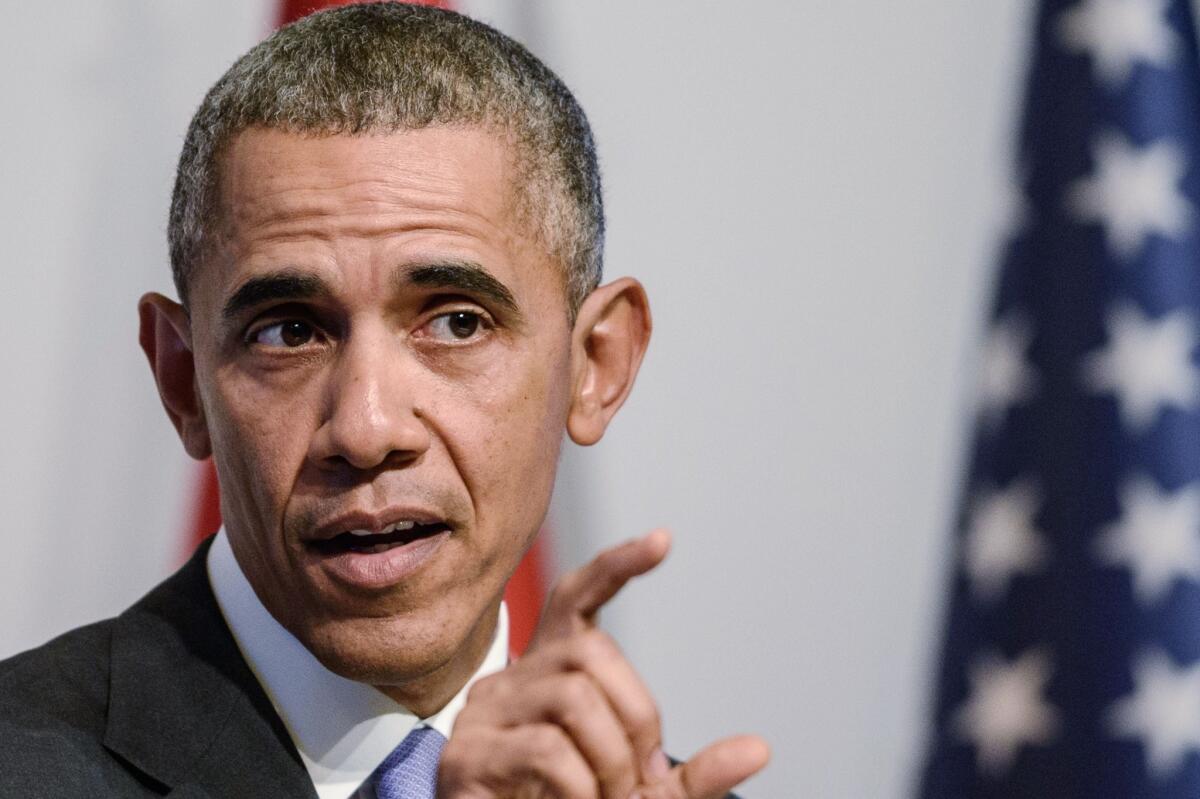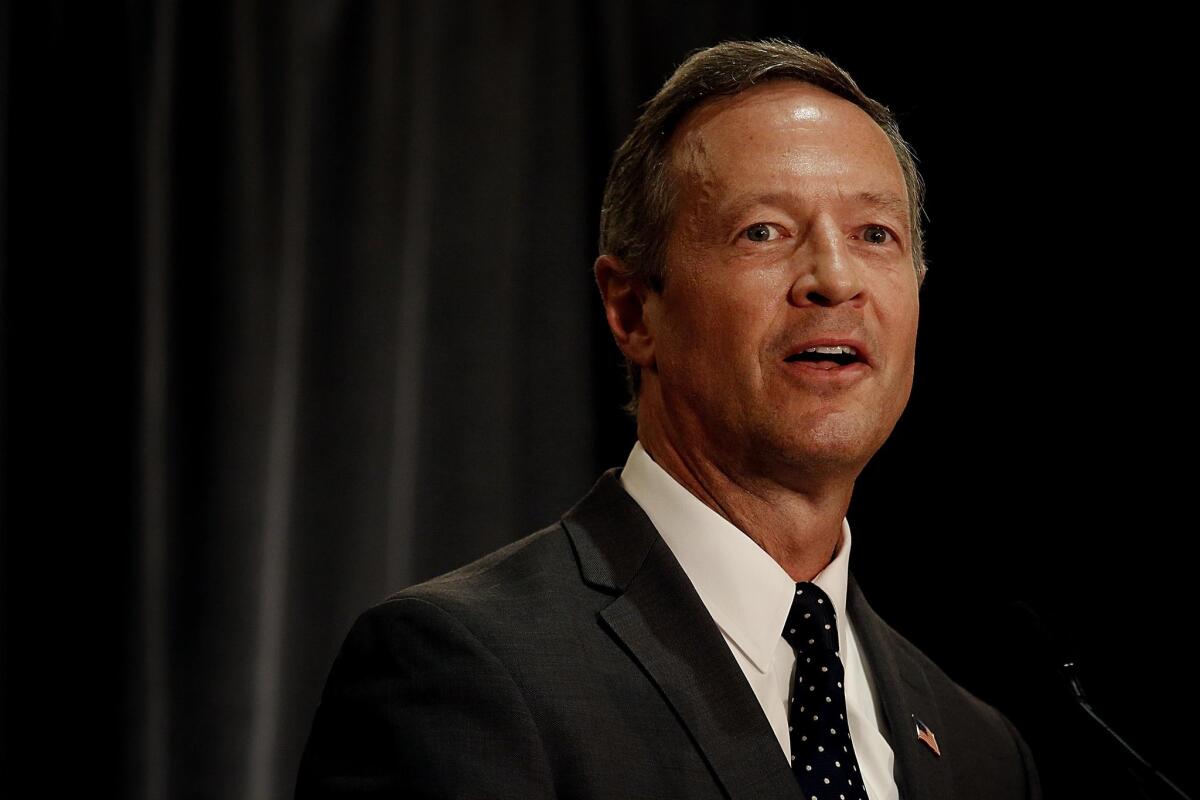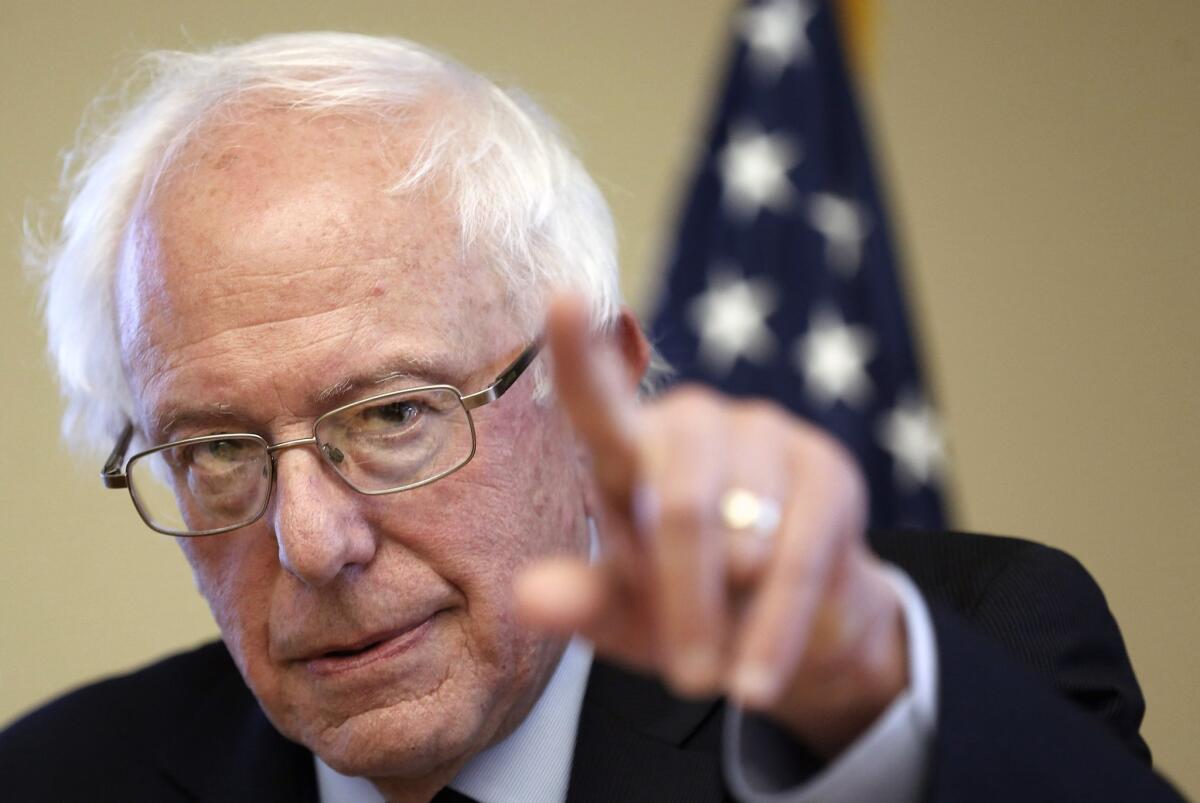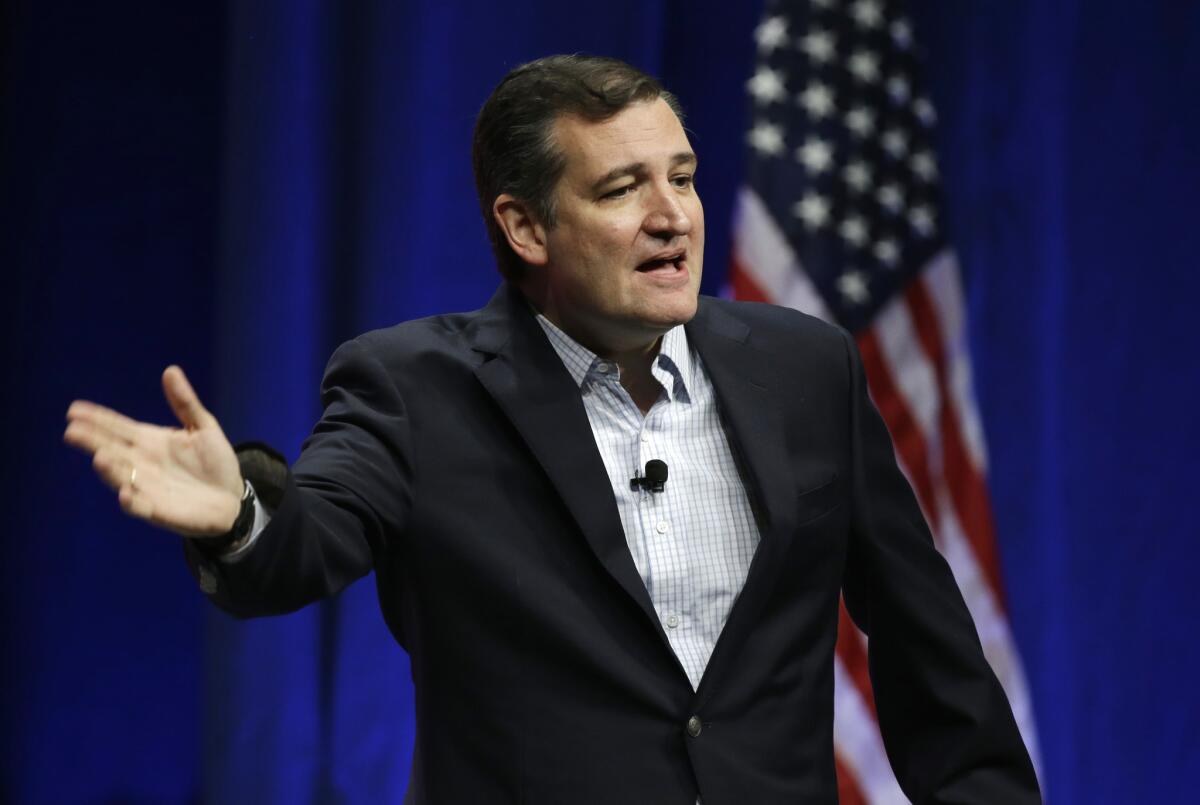GOP presidential candidates assail Obama’s ISIS plan, but their ideas sound similar
By the numbers
Welcome to Trail Guide, your host through the wilds of the 2016 presidential campaign. It's Monday, Nov. 16, and this is what we're watching:
- When it comes to defeating ISIS, the plans floated by Republicans are similar to those put forward by President Obama
- Meanwhile, Obama says accepting refugees into the U.S. based on their religion is "not American"
- Texas Sen. Ted Cruz , once viewed as extreme, looks more palatable as a candidate, thanks to rivals Donald Trump and Ben Carson. The Times' Lisa Mascaro explores how
- Cruz secured the endorsement of Rep. Steve King (R-Iowa) , a hardliner on immigration
- Bernie Sanders, trailing Hillary Rodham Clinton by double digits in national polls, is in Cleveland this evening for a rally
- The Democratic debate over the weekend netted nearly 8.6 million viewers
In wake of Paris attacks, GOP presidential hopefuls assail Obama's ISIS strategy, but their plans are similar

US President Barack Obama gestures during a press conference following the G20 summit in Antalya on November 16, 2015. Obama said on November 16 the United States had no precise intelligence warning of the Paris bombing and shooting attacks that have been claimed by Islamic State group jihadists. The United States has agreed to speed up its sharing of military intelligence with France to try to avert such assaults, the US leader added in a news conference after a summit in Turkey. AFP PHOTO /OZAN KOSEOZAN KOSE/AFP/Getty Images ** OUTS - ELSENT, FPG, CM - OUTS * NM, PH, VA if sourced by CT, LA or MoD **
From the intensity of their rhetoric, the candidates seeking to replace President Obama might sound like they have policies for combating the Islamic State militants that are dramatically different from his. So far, they don't.
At a news conference Monday, Obama made clear that in the aftermath of the Paris attacks that Islamic State claimed to mastermind, he intends to stick with his plans.
“The strategy that we are putting forward is the strategy that ultimately is going to work,” he said, speaking at the end of an international summit here. Though he repeated his pledge to “intensify” U.S. efforts, he rejected the idea that the U.S. should take dramatic new actions in the wake of the Paris attacks just to “look tough.”
The major candidates in both parties have called for airstrikes against Islamic State positions in Syria and Iraq, providing arms to Kurdish and Arab militias and building coalitions with U.S. allies and regional partners, all of which the administration has been doing for more than a year.
In effect, despite much heated language, the candidates in both parties have been arguing that they would pursue the same approach as Obama, but would do it better. Few, if any, envision a quick solution, meaning that regardless of who wins the next election, the likelihood is that Islamic State will still control a large swath of territory in the Euphrates River valley, stretching from eastern Syria into western Iraq, well into the next president’s tenure.

Former Maryland Gov. Martin O’Malley has run a by-the-books presidential campaign. But so far, the Democratic hopeful has won only meager support.
Obama: Religious test for refugees like the one Cruz proposed is ‘shameful’
President Obama took issue with Sen. Ted Cruz (R-Texas) here on Monday for suggesting what Obama called a "religious test" for refugees trying to come to the U.S. from the war-torn Middle East.
Obama's remarks followed Cruz’s suggestion that Christians entering the U.S. don't pose a threat as Muslim refugees from Syria do.
"That's shameful," Obama said, speaking to reporters at the conclusion of the Group of 20 summit here. "That's not American. It's not who we are. We don't add religious tests to our compassion."
The president never said Cruz's name, but he mentioned critics who “themselves come from families who benefited from protection when they were fleeing political persecution.” Cruz has said that his father left Cuba for the U.S. in the 1950s to get away from torture and oppression.
After the Paris attacks on Friday, Cruz said at a campaign event in South Carolina that there is "no meaningful risk of Christians committing acts of terror," according to the Washington Post. He also called for Muslim refugees from Syria to be barred from entering the country.
"If there were a group of radical Christians pledging to murder anyone who had a different religious view than they, we would have a different national security situation," Cruz said.
In September, as the refugee crisis ballooned in Europe, Obama ordered his administration to bring 10,000 Syrian refugees into the U.S., more than the 1,300 who have come to the country since the start of the civil war in Syria four years but far fewer than advocates had called for, and a tiny fraction of the millions who have flooded into Europe.
Because of intensive vetting due to security concerns, the process to approve a refugee for resettlement takes 18-24 months, the Obama administration has said.
Rep. Steve King of Iowa, a hard-liner on immigration, backs Ted Cruz for president
Is Ted Cruz surging?
On Monday, the Texas senator netted the endorsement of Rep. Steve King of Iowa, a champion of conservatives in the Hawkeye State.
King's support was sought by several Republicans looking to tap into the conservative grass roots of the state where caucus-goers will open the 2016 election cycle in early February.
At a moment in the campaign when immigration is a key issue dividing the GOP field, King's endorsement could give Cruz a boost among some in the party as he talks about cracking down on those in the country illegally.
The Times' Lisa Mascaro recently traveled to rural Texas to explore Cruz's candidacy.
Sanders takes a harder stance on U.S. efforts against Islamic State

Presidential candidate Sen. Bernie Sanders speaks during a campaign stop at a senior center in Manchester, N.H. on Oct. 30.
Sen. Bernie Sanders is open to the U.S. working more broadly with Russia and Iran to fight Islamic State, he said Sunday at a speech in Iowa.
"We have different points of view. But Russia has got to join us,” Sanders, who is seeking the Democratic nomination for president, said at Simpson College outside Des Moines. “We are concerned about Iran, but Iran has to join us. We have concerns about Saudi Arabia, but Saudi Arabia has to join us. If all over the world these attacks are taking place, the world has got to come together."
He didn’t clarify what kind of support he would offer as president, though. Russia has begun conducting airstrikes against Islamic State in support of its ally, Syrian dictator Bashar Assad, and Iran has also fought against the extremist group but the U.S. stresses it is not coordinating with the Islamic republic.
Sanders is staunchly anti-interventionist and has said he doesn’t want the U.S. to lead military action against Islamic State but has said he’d be willing to go to war when necessary. His willingness to support working with Russia means more action in Syria.
During the first Democratic debate, Sanders said he will do everything to stop the U.S. from getting into another “quagmire” like the war in Iraq.
At the candidates’ second debate Saturday, Sanders stood by his view that climate change is still the greatest threat to national security and relates directly to the growth of terrorism.
His firmer stance on the U.S. involvement against Islamic State, though, shows his efforts to respond to calls for more foreign policy discussion in the campaign for 2016.
"When you have Russia, when you have Iran, when you have Saudi Arabia, when you have western Europe, when you have those countries united in the fight against ISIS, we will destroy ISIS," he said after his Iowa speech Sunday, using an alternative name for Islamic State.
Trump on Islamic State: 'I told you so'
As French forces launched airstrikes Sunday against an Islamic State stronghold in Syria in retaliation for the Paris attacks, Donald Trump called the actions a late response. The Republican presidential candidate tweeted “I told you so," referring to his earlier support for Russian airstrikes in Syria.
Trump went on to say during an interview Monday on CNBC’s “Squawk Box" that the
U.S. and allies should have targeted the terrorist group's hold on oil facilities and its funds before the attacks in Paris.
Gunmen and suicide bombers killed at least 129 people at restaurants, a stadium and a concert hall in Paris on Friday. Islamic State has claimed responsibility.
How Ted Cruz, who has rankled many, plans to win the GOP nomination

In this Nov. 13, 2015, photo, Republican presidential candidate, Sen. Ted Cruz, R-Texas, addresses the Sunshine Summit in Orlando, Fla. Out on the presidential campaign trail, Sens. Marco Rubio and Cruz are rising in the polls. Back in the Senate, their ambitions can sometimes cause a nuisance for fellow lawmakers, including vulnerable Republicans up for re-election next year. (AP Photo/John Raoux)
When Sen. Ted Cruz jumped into the Republican presidential primary, he was largely dismissed as an attention-grabbing agitator with a knack for firing up conservatives, whose long-shot campaign was destined to remain on the fringes.
But as the GOP contest winnows into a defining struggle between the party’s establishment and conservative factions, the ostrich-boot wearing Texan suddenly looks like the hard-right candidate best positioned to go the distance, perhaps even squaring off for the nomination.
Cruz's rise is partly the result of methodical campaign planning, but also sheer luck.
The surprise appeal of Donald Trump and Ben Carson has redefined ideas about who is considered a political outsider. Billionaire Trump’s bombastic style and sometimes offensive campaign has left Cruz looking more presidential. And compared to Carson, the first-term senator seems experienced. If those front-runners eventually fade, as some expect they will, Cruz is poised to scoop up their large base of anti-establishment supporters.
Meanwhile, Cruz is quietly amassing a war chest from small donors and big-ticket fundraisers, giving him more cash on hand than any other GOP candidate. The average donation from his 360,000 contributors has been $73.
He has tirelessly built an enthusiastic army of grass-roots volunteers and local infrastructure in counties across the early nominating states. And his billionaire-backed super PACs are flush, giving him staying power even if doesn't win the early primaries.
By the numbers
Get the L.A. Times Politics newsletter
Deeply reported insights into legislation, politics and policy from Sacramento, Washington and beyond. In your inbox three times per week.
You may occasionally receive promotional content from the Los Angeles Times.







